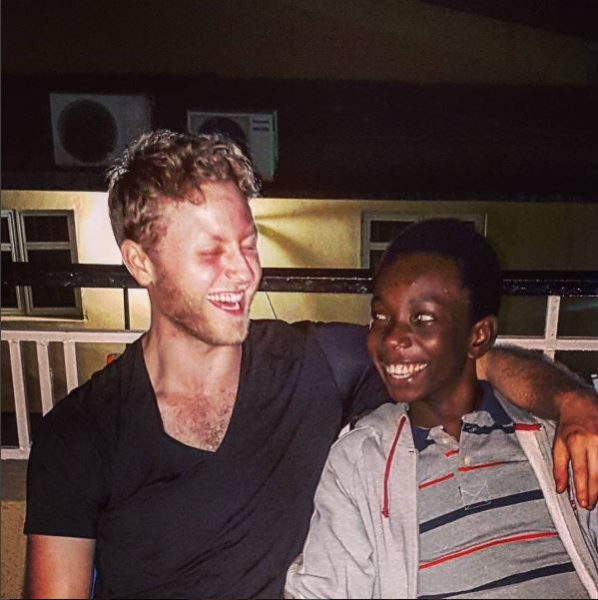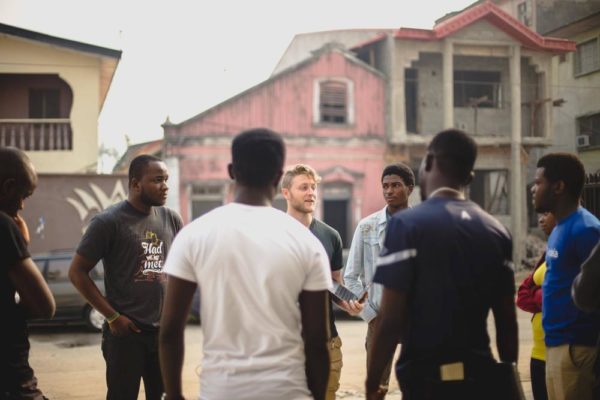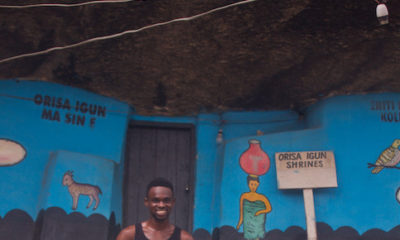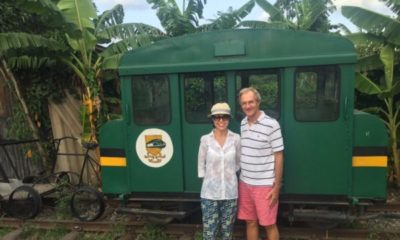Features
The Village Pot Presents…Alejo Project! Meet Michael Rosenberg & Read His Fascinating Nigerian Story
 The Village Pot team sent us this exciting idea they had called The Alejo Project and we are very pleased to present the first in the series.
The Village Pot team sent us this exciting idea they had called The Alejo Project and we are very pleased to present the first in the series.
So what is The Alejo Project?
Alejo means ‘guest in Yoruba. In Alejo Project (#alejoproject), we tell the undiluted stories of foreigners who have moved to Nigeria. This project tells first-hand stories of their own Nigeria and is curated by The Village Pot; an online platform for uncovering food, culture and travel stories across Africa.
On this first part of the series, The Village Pot focuses on Michael Rosenberg. He shares his Alejo experience and it is truly interesting to see our home through the lens of foreigners who have actually come to visit and live here.
We hope you enjoy the stories that will be shared here… and we welcome feedback, as always.
***
Michael Rosenberg moved to Nigeria in June of 2015 from the United States where he was born and raised. In telling us his Nigerian story, he runs through the stereotypes of Africa he had been exposed to, “violence, poverty, disease, corruption, yada, yada…” Then, he outlines what he describes as the ‘platitudes that combat these stereotypes.’ In his words, “Africa is diverse and filled with beauty. Stereotypes are stereotypes and they can often be over-generalisations, if not outright misconceptions.” In university, he had taken a number of courses on global developing world politics and economics and his sister’s first-hand experience in Africa groomed him against blatant naivete. No wonder he seems to have come more prepared than most.
As he recalls his feelings at the time just before his decision, it is easy to sense the angst he must have felt in steering his life in such a new direction. “Honestly, I did not know what to expect“, he laments, “I thought it would be very very different from what I was used to on the American East Coast and I thought it would be difficult or really difficult at times. I also thought it might be scary, and odd, and sometimes incomprehensible. But, I expected it to be a transformative experience.”
“So, I quit my job, broke up with my girlfriend and said goodbye to friends“
While living in New Jersey, Michael worked at a restaurant and took side jobs with universities and non-profit organisations. However, his willingness to uproot his life will boil down to impatience. Michael says, “I was impatient because I could not find an opportunity that I really wanted to commit myself to.” His next decision is nothing short of brave: “So, I quit my job, broke up with my girlfriend, said goodbye to friends and made plans to road trip around the US for a few months.” A week later and in the midst of trying to sort out his long-term plans, he met Jeremy Johnson, co-founder and CEO of Andela and was compelled by the story of the technology start-up. In no time, Michael’s curiosity about Africa combined with his interest in education and technology would marry and bear fruit. He continues, “In three weeks, I was on a plane to Nigeria to lead an intensive soft skill training program for the brightest minds in Africa on their journey toward global technology leadership.“
 First Impressions of Nigeria
First Impressions of Nigeria
“It was somewhat overwhelming and pointed to the highs and lows that characterise life in Nigeria – warm people and the strife of underdevelopment.“
Coming into Lagos, Michael decries the international airport in the city as a disgrace and an unfortunate welcome to a fascinating country. “For such a beautiful country, The Murtala Muhammed airport is one of the worst places I have been to in the world.” After being asked for a bribe within fifteen minutes of arrival and threatened with quarantine, Michael had gotten a taste of what he describes as “the great corruption imposed on the nation.” His flight experience prior to arrival was much different, however, and was instrumental in easing up his airport experience. “On the plane, I met a warm and wonderful woman who assisted me through customs and welcomed me to Nigeria.” His host also eventually emerged from the crowd and took him to get his first meal. You guessed it…jollof rice! “Before heading to a big and beautiful modern estate, we stopped to get some jollof rice and chicken to eat“, Michael says. He goes on… “it was somewhat overwhelming and pointed to the highs and lows that characterise life in Nigeria – warm people and the strife of underdevelopment.” He would eventually go on to document these first few hours in Nigeria in a post on his blog.
Favourite Meals and Memories
“My fond memories are too many to count,” he quips, “but three off the top of my head are a late-night bonfire on Tarkwa Bay, my first Afropolitan vibes at Freedom Park, and a trip to Port Harcourt for Thanksgiving.“
As he delves into his food experience in Nigeria, Michael delicately provides an objective perspective on Nigerian food. “Nigeria does not have the most cosmopolitan and palatable cuisine in the world“, he says before recounting how his stomach was upset for a whole month after he moved to Nigeria. He mentions that his stomach seems to settle more with the cuisine of Cote D’Ivoire where French and Portuguese influence tempers the strength of West African flavours. But with time, he has come to appreciate some Nigerian meals and even lists his go-tos: okra stew, grilled fish, jollof rice and his favorite, plantain and egg.
His other memories are more exciting. He fondly recounts the people he has had a chance to connect with – artists, musicians, entrepreneurs and curious thinkers, branding these connections as his favorite memories. He credits his discoveries of Yaba tech hubs, Victoria Island restaurants, Ikoyi galleries and Lekki beaches to these incredible people. “My fond memories are too many to count,” Michael quips, “but three off the top of my head are a late-night bonfire on Tarkwa Bay, my first Afropolitan vibes at Freedom Park, and a trip to Port Harcourt for Thanksgiving.“
Michael admits that being an oyinbo (Caucasian) man has made it difficult for him to fit in, without constant reminder that he is different. “I’m not sure if I will stay much longer“, he suggests, “I love Nigeria and I have a community here but it does not feel like home and I am not sure it ever will.” Even in spots where he goes to relax, he is constantly being asked to dance, a sort of performance of his Nigerian-ness, and not being allowed to forget that he is a visitor can be exhausting. He continues, “it takes its toll when someone is always shouting ‘oyinbo’ or asking me to do a Nigerian dance move at the beach.” Perhaps, it would have been an easier decision for him to make if he could ever be just a part of the crowd and not treated as a spectacle.
“…it takes its toll when someone is always shouting ‘oyinbo’ or asking me to do a Nigerian dance move at the beach.“
He could live here for another year or two, he predicts, “though I may move back to the US with frequent travel back to Nigeria.”
***
Would you like to recommend someone to be featured in Alejo Project? Send an e-mail to [email protected] or leave a comment below























